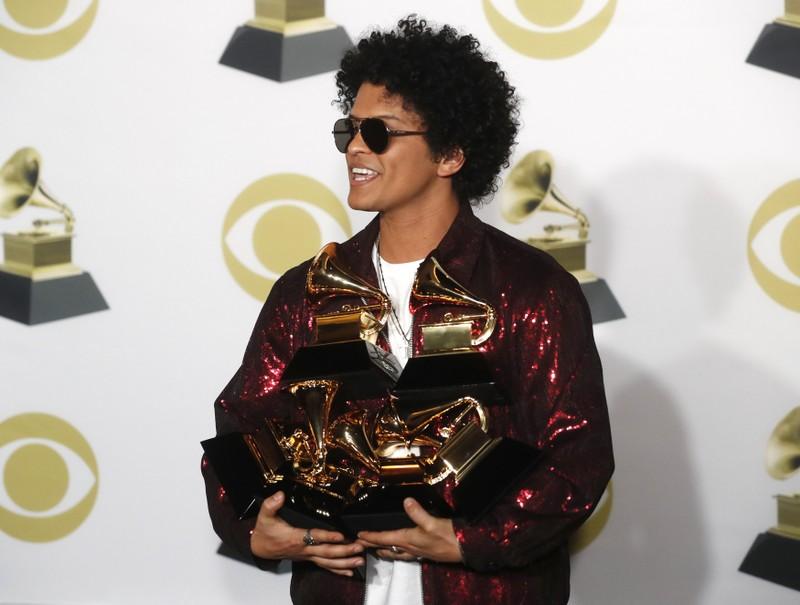Despite a show filled with conscious and powerful protest moments, the GRAMMY Awards themselves remain conservatively oriented towards an objective ideal of musical excellence.

60th Annual Grammy Awards – Photo Room – New York, U.S., 28/01/2018 – Bruno Mars poses with his Grammys for Record of the Year and Album of the Year for “24K Magic” and Song of the Year for “That’s What I Like”. REUTERS/Carlo Allegri
One of the most talked-about moments during last night’s GRAMMY Awards telecast came during a James Corden-led bit to determine which celebrity should record the audiobook version of Michael Wolff’s noted political tell-all Fire and Fury: Inside the Trump White House. The joke went that voicing the audiobook would essentially guarantee the lucky narrator an award for next year’s Best Spoken Word Album category, given the book’s high profile and salacious content. John Legend, Cardi B, Snoop Dogg, and others read the book’s juiciest lines, skewering the President’s lack of interest in his job (and his love of cheeseburgers) before the eventual winner—Hillary Clinton—pointedly read another passage on McDonalds as a massive applause from the assembled crowd at Madison Square Garden drowned her out. “That’s it! We’ve got it! That’s the one,” Corden said, assuring Clinton her GRAMMY is “in the bag.”
Not all were amused. Most notably, United States Ambassador to the United Nations Nikki Haley tweeted, “I have always loved the Grammys but to have artists read the Fire and Fury book killed it. Don’t ruin great music with trash. Some of us love music without the politics thrown in it.” The tweet was liked 44,000 times and received 13,000 retweets.
“Stick to music” hasn’t quite gained the same momentum that “stick to sports” has in the athletics world, but clearly some GRAMMY viewers would agree with Haley’s comments. They wanted their television spectacle without the side of protest politics, woke hashtags, and coded-message fashion choices—an escapist party where music took center stage. But what’s troubling is that outside of that bit and a set of incredible performances that dove head-on into social issues, the GRAMMY Awards themselves drew a stark and clear line between social context and musical excellence.
Bruno Mars was the evening’s big winner, clean sweeping the “big three” Album, Record, and Song of the year categories. Bruno Mars is a tremendously skilled entertainer—a dream vessel for the pop song whose greatest strength is an ability to translate black musical tropes into unthreatening radio fodder. But he’s also a largely apolitical one who, during his speech for Record of the Year, begged the house audio engineers to keep playing his music, lamenting what he saw as “Too many ballads!” among the performances.
Those performances included Kesha’s #MeToo moment with a stirring performance of “Praying,” her address to abuser Lukasz “Dr. Luke” Gottwald; Kendrick Lamar’s satirical and gunshot-filled opening song; and Alessia Cara, Khalid, and Logic’s suicide-prevention anthem that uses the National Suicide Prevention Hotline’s phone number, “1-800-273-8255” as its title. The evening’s musical performances were its beating heart—a platform taken by a diverse set of artists who used “music’s biggest night” to speak truth to power.
The trophies, on the other hand, continued a problematic trend of style over substance, where the album, song, and record most close to the Recording Academy’s platonic ideal were rewarded over work that more clearly reflected the contemporary zeitgeist. Two years ago, Kendrick Lamar’s Black Lives Matter anthems lost out to Taylor Swift’s celebratory 1989. Last year, Beyoncé Knowles’s made Lemonade from lemons and got women into “Formation” months before #MeToo and the related sexual harassment scandals rocked the entertainment business. You probably already know that she didn’t win either.
Despite the show’s patented #GrammyMoments, what ultimately goes in the record books is wins, not performances. This is an awards show, after all. Foregrounding the political in performances then ignoring it when the golden gramophone trophies come out is like speaking out against global poverty and then hiding your millions in tax shelters. It’s optics constructed for a focus-group-tested audience while preserving your own sense of superiority when the real important decisions get made.
None of this is intended as too harsh a critique of Mars—he is a deserving winner who made an opulent and unassailable record with his trademark Teflon sheen. But it’s a record that too willingly plays by a set of rules laid out by the voters’ precedents and preferences about what exceptional music is supposed to sound like. It’s a record that—compared to the complicated (and imperfect) politics of Jay Z and Kendrick Lamar, the provocative strangeness of Childish Gambino, and the vulnerable melodrama of Lorde—feels unbelievably safe. And ultimately what it suggests is a continued belief on the part of the Recording Academy that its measures are objective and that social context is irrelevant when it comes to judging musical excellence.
After last year, when many of us raised concerns about the GRAMMYs record on race, Recording Academy President Neil Portnow suggested in an interview with Pitchfork that GRAMMY voters possessed an expertise that allowed them to transcend identity politics and identify music that was inherently excellent on its own measure. “We don’t, as musicians, in my humble opinion, listen to music based on gender or race or ethnicity,” he said. “When you go to vote on a piece of music—at least the way that I approach it—is you almost put a blindfold on and you listen. It’s a matter of what you react to and what in your mind as a professional really rises to the highest level of excellence in any given year.”
What followed was the most diverse set of mainstream-category nominees in the awards’ sixty-year history, but Portnow doubled down, suggesting that politics had had no impact on voters’ hearts (and ears). “I honestly think that our community—musicians—really listens with their ears more than their eyes or anything else,” he told Variety. “I think our community is very open-minded and thinks about music in a universal more holistic fashion, but our voters in particular are thinking about the craft. So I don’t know that there’s a movement here as a result of criticism and difficulties in the film or TV industry—I just think this is how our highest level of professionals feel about music today.”
This is a capitulation—a “we stick to music” mindset that suggests that it just so happened that the most-excellent music came from black and brown artists at a rate never before seen in the usually-coded-white mainstream categories. It just so happened that 90.7% of the “best” music made in the last six years was made by men. The GRAMMYs claim to music-expert objectivity–and their voting decisions that come as a result of those claims—are an ultimately conservative stance that unnecessarily depoliticizes its awards by relying on falsely wedded notions of expertise and objectivity.
So while the triumphs of the 2018 GRAMMY Awards were numerous, the trophies themselves told a different story. “Be not scared to use your voice especially in instances like these when you have the opportunity!” Logic implored in a spoken-word monologue after his performance. With Bruno Mars’s GRAMMY sweep, the industry itself missed an opportunity that its artists took.

 Share On Facebook
Share On Facebook Tweet It
Tweet It







